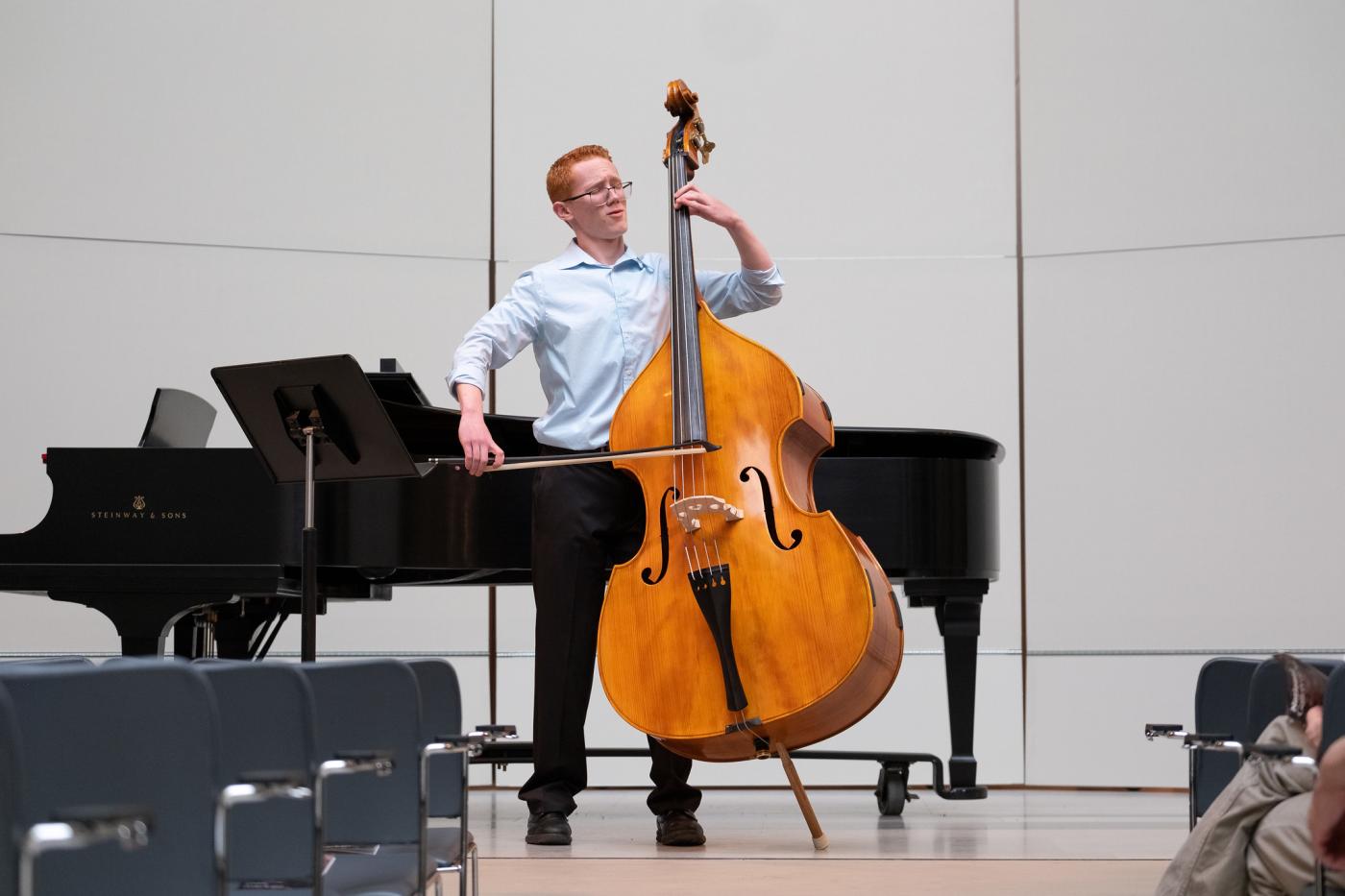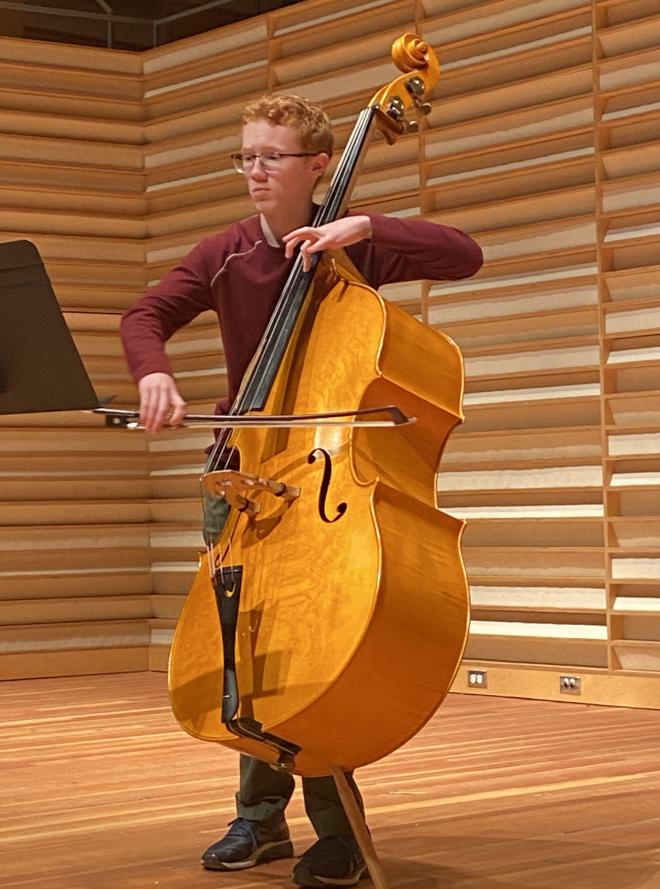From the Top, a nationally syndicated radio program produced by National Public Radio (WETA is an NPR affiliate) is broadcast on WETA Classical every Sunday at 6pm. If you’re not already in the habit of listening to this fantastic program, I can’t too enthusiastically encourage you to tune in.
I especially want our listeners and blog readers to know about the From the Top Musicians with Disabilities Special Initiative, which will be co-hosted by From the Top alumna Julia LaGrand; she also serves as a content advisor for the episode airing on WETA Classical on April 2.
We love it when a local hero makes good, so we’re excited to see Washington-area double bass virtuoso Joshua Thrush, a 16-year-old student at James Madison High School in Vienna, Virginia, featured in the episode.
I reached out to this gifted young string player to learn more about him and the From the Top initiative.
Evan Keely: What do you want our readers to know about you?
Joshua Thrush: I’m really honored to have been included in this From the Top episode and hope everyone enjoys the piece I’ll be playing, Giovanni Bottesini’s Introduction and Gavotte, which is a Romantic era piece based on an old French dance.
EK: How did you get involved with the From the Top Musicians with Disabilities Special Initiative?
Joshua Thrush: Around April of last year, I was notified by my youth orchestra that From the Top was planning a show to highlight musicians with disabilities. I was born with a form of spina bifida that results in some physical challenges and had already been thinking about applying for the regular program. This special show, however, seemed like the perfect opportunity to not only share my music but contribute to the greater cause of awareness around disability in the field of music.
EK: Your teacher is Ira Gold, a double-bassist with the National Symphony. How did this relationship come about? What’s it been like for you to study with this teacher?
Joshua Thrush: I began the double bass in 4th grade and started studying with Ira Gold within a few months. My cousin plays bass in the Los Angeles Philharmonic and knew Ira from college, so that is how I ended up getting lessons with him at such a young age. It has been a great experience studying with a teacher at the level of Ira Gold. He has allowed me to advance my technical and musical abilities at a quicker rate and to be exposed to the type of teaching that many students don’t encounter until they go to college or conservatory. If I did not have the connection to Ira Gold that allowed me to study with him, I would have just found a local teacher that may not have been as beneficial in the end for my progression on the double bass.
EK: There are those that say: if you want to learn something, teach it. Has that been your experience teaching double bass to elementary school students?
Joshua Thrush: I think teaching the bass to younger kids has definitely helped me to understand and isolate specific skills and techniques that go into overall playing. Most musicians also teach at some point in their career, so I’m grateful for the chance to experience what teaching is like and, hopefully, help my students enjoy playing the bass as much as I do.
EK: I see you’re a Boston University Tanglewood Institute alumnus. (I taught there in the Young Artists Vocal Program back in the early ’90s.) You’ve also made music in other summer festivals and programs, including Birch Creek Symphony and the National Philharmonic Summer Strings. Some others of your many performance and competition experiences include playing last year and the year before in the Northern Virginia Senior Regional Orchestra, and last year in the All-Virginia High School Orchestra. You’ve taken first prize in a number of competitions, including the Great Composers Series Best Bach Performance Competition and the National Philharmonic Solo Bach Competition; you also received the 2022 National Federation of Music Clubs’ Joyce Walsh Junior Disability Award. What are some of the more memorable takeaways from these kinds of experiences that you’d like us to know about?
Joshua Thrush: My first summer program experience with bass was actually Bass Works in Maryland, which I did for three summers in a row between fifth and eighth grade. This program spans from young beginning bassists to seniors in high school. I remember being very impressed by the abilities of the older kids and wanting to play like them. I got to do my first recital at Peabody as part of that program. The following year, at the end of eighth grade, I won a major international competition — the International Society of Bassists 14 and under Solo Competition. This win was the start of many more opportunities for me, including all of those you’ve already mentioned. Each experience I’ve had, whether it was attending a summer festival or placing in a competition, has exposed me to other amazing musicians, which in turn motivates me to keep practicing and improving my own playing.
EK: I really like the Daily Joy video of you performing Hans Fryba’s Suite in the Olden Style. What’s some other repertoire you’re working on that’s especially important to you?
Joshua Thrush: Some other repertoire that I am currently working on include all three movements of the Dittersdorf Double Bass Concerto, Spagnolo by Olga Magidenko, and various movements from Bach’s fourth Cello Suite. Much of my repertoire connects to the ISB 15-18 Solo Competition that I am preparing for right now. It will take place in June and I have been extensively studying and practicing my music for that. On an orchestral note, I have taken more of a focus toward orchestral excerpts in order to refine my technique for when I eventually audition for a symphony. Symphony auditions are mainly decided on one’s orchestral playing, and this is a reason why I have been putting more effort into improving my excerpts.
EK: What do you want our readers to know about your plans after you graduate from James Madison High School?
Joshua Thrush: My post-graduation plans are to attend a music conservatory and to obtain a bachelor’s of music degree. After college, or during it if I am lucky, I hope to get a position in a major orchestra in the United States.
PBS PASSPORT
Stream tens of thousands of hours of your PBS and local favorites with WETA+ and PBS Passport whenever and wherever you want. Catch up on a single episode or binge-watch full seasons before they air on TV.

